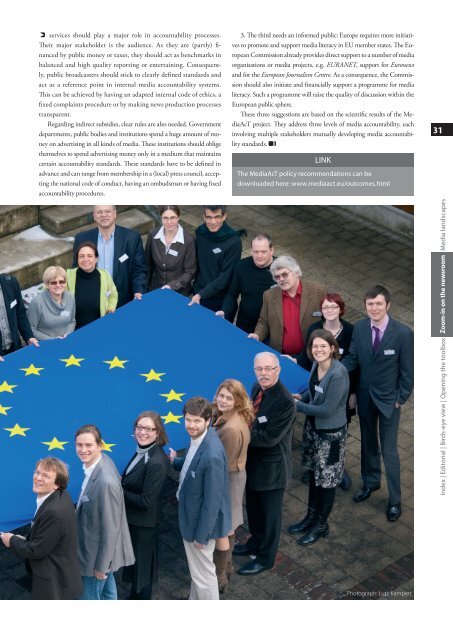MediaAcT
How fragile is media credibility? Accountability and transparency in journalism: research, debates, perspectives Final Research Report | Media Accountability and Transparency in Europe
How fragile is media credibility? Accountability and transparency in journalism: research, debates, perspectives
Final Research Report | Media Accountability and Transparency in Europe
Create successful ePaper yourself
Turn your PDF publications into a flip-book with our unique Google optimized e-Paper software.
services should play a major role in accountability processes.<br />
Their major stakeholder is the audience. As they are (partly) financed<br />
by public money or taxes, they should act as benchmarks in<br />
balanced and high quality reporting or entertaining. Consequently,<br />
public broadcasters should stick to clearly defined standards and<br />
act as a reference point in internal media accountability systems.<br />
This can be achieved by having an adapted internal code of ethics, a<br />
fixed complaints procedure or by making news production processes<br />
transparent.<br />
Regarding indirect subsidies, clear rules are also needed. Government<br />
departments, public bodies and institutions spend a huge amount of money<br />
on advertising in all kinds of media. These institutions should oblige<br />
themselves to spend advertising money only in a medium that maintains<br />
certain accountability standards. These standards have to be defined in<br />
advance and can range from membership in a (local) press council, accepting<br />
the national code of conduct, having an ombudsman or having fixed<br />
accountability procedures.<br />
3. The third needs an informed public: Europe requires more initiatives<br />
to promote and support media literacy in EU member states. The European<br />
Commission already provides direct support to a number of media<br />
organisations or media projects, e.g. EURANET, support for Euronews<br />
and for the European Journalism Centre. As a consequence, the Commission<br />
should also initiate and financially support a programme for media<br />
literacy. Such a programme will raise the quality of discussion within the<br />
European public sphere.<br />
These three suggestions are based on the scientific results of the <strong>MediaAcT</strong><br />
project. They address three levels of media accountability, each<br />
involving multiple stakeholders mutually developing media accountability<br />
standards.<br />
lInk<br />
The <strong>MediaAcT</strong> policy recommendations can be<br />
downloaded here: www.mediaact.eu/outcomes.html<br />
Photograph: Lutz Kampert<br />
1<br />
Index | Editorial | Birds-eye view | Opening the toolbox | Zoom-in on the newsroom<br />
| Media landscapes


